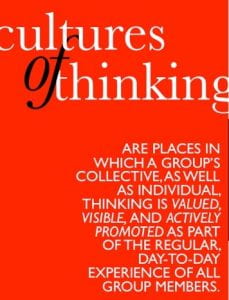
On our first staff professional development day in January, we focused on the Creating Cultures of Thinking framework from Harvard’s Project Zero. We examined changing skills for the workplace, the rise of enterprise skills, and Australia’s declining PISA results, which indicate that Australian students are good at routine work but struggle in more complex situations.
We thought about who our students are becoming as a result of their time with us and how we can push beyond memory work towards cultivating dispositions. We considered the story of learning at our school and the messages we send about learning, particularly thinking about what happens in the first lesson of the school year. We unpacked Ron Ritchhart’s research on creating a culture of thinking. He defines a culture of thinking as a place “in which a group’s collective as well as individual thinking is valued, visible, and actively promoted as part of the regular day-to-day experience of all group members.” We discussed the expectations we have for students, the language we use in the classroom, how we use our time and energy, how we model who we are as thinkers and learners, how we can bump us tasks so that students really have to think or delve deeply, how we can make thinking routine, the importance of relational connections and interactions, and how we utilise flexible learning spaces and display student learning.
We also considered how our professional learning time should be full of questioning and exploration, learning from each other and building a shared language.
We would like our story of learning to be one of active and engaged thinking, where we nudge from covering content towards thinking deeply about the sort of learners we are producing – adaptable, independent, curious, and reflective.

The PISA results show a serious problem, and not one that’s exclusive to Australia. Despite all of the technological advancements, PISA results in the U.S. haven’t really improved in two decades. I think your suggestion of pushing beyond memory work and cultivating a culture of thinking is a great start!
Hi Charles, I look forward to the annual comments from Stockton. Enjoy your course. Cameron